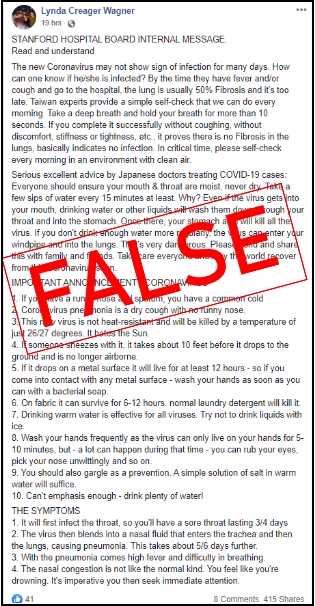As Ghana and other countries around the world work to address the pandemic spread of COVID-19, posts disseminated by tens of thousands on Facebook, Instagram, Twitter and WhatsApp are misinforming people about how to avoid and self-test for the disease caused by the coronavirus.
This post provides some of the widely-shared supposed tips about the virus, such as wrongly instructing people to hold their breath to gauge whether they’ve been infected and falsely suggesting that water consumption can kill the virus. Most of these false claims are promoted in WhatsApp groups and other text-based media as well as screenshots.
The posts in some cases cite “Taiwan experts” or “Japanese doctors,” and “Palestinian serum” or “Senegalese serum” and many begin by falsely sourcing the text to Universities or Research Laboratories

Here are some of the claims from the posts, and why they’re inaccurate:
Claim: “Take a deep breath and hold your breath for more than 10 seconds. If you complete it successfully without coughing, without discomfort, stiffness or tightness, etc., it proves there is no Fibrosis in the lungs, basically indicates no infection.”
Facts: There’s no evidence to suggest this is a valid test for COVID-19. What’s more: “We know that people infected with coronavirus may show symptoms within 14 days and that this virus can lead to severe complications,” – acute respiratory distress (not being able to breathe) and septic shock (the virus infecting your bloodstream), not fibrosis, as mentioned in the false claims.”
Claim: “If you have a runny nose and sputum, you have a common cold … Coronavirus pneumonia is a dry cough with no runny nose.”
Facts: While the most common symptoms of COVID-19 are “fever, tiredness, and dry cough,” according to WHO, some patients do have “aches and pains, nasal congestion, runny nose, sore throat or diarrhoea.” Some who are infected don’t show any symptoms. Also, a WHO report said that, based on an examination of more than 55,000 confirmed COVID-19 cases, 33% had sputum (phlegm) production.
Claim: “Everyone should ensure your mouth & throat are moist, never dry. Take a few sips of water every 15 minutes at least. Why? Even if the virus gets into your mouth, drinking water or other liquids will wash them down through your throat and into the stomach. Once there, your stomach acid will kill all the virus.”
Facts: The WHO has shot down this theory, saying that, “[w]hile staying hydrated by drinking water is important for overall health, it does not prevent coronavirus infection.”
Moistness of your mouth and throat have nothing to do with the likelihood that you will develop disease, and simply drinking water to ‘rinse’ your digestive track will not prevent you from being infected or from getting sick.” Water consumption, she added, “has no bearing on the virus getting into your airways and lungs; if you breathe in an infected person’s respiratory droplets, the virus will travel through your airways.
– Krys Johnson, assistant professor of epidemiology and biostatistics at Temple University
CDC officials recommend people clean their hands often, for at least 20 seconds — or use hand sanitizers with at least 60% alcohol as an alternative — and avoid touching their faces and mouths. They also suggest social distancing, which can help curb the spread of the virus.
Claim: “This new virus is not heat-resistant and will be killed by a temperature of just 26/27 degrees.”
Facts: What, exactly, these posts are referencing is unclear. The CDC has said it’s “not yet known whether weather and temperature impact the spread of COVID-19.”
The WHO has said there is “no reason to believe that this virus would behave differently in different temperatures.
To avoid sharing these ‘dangerous’ and false claims, verify all information related to the coronavirus and COVID-19 at the Ministry of Information (Ghana), Centers for Disease Control and World Health Organization websites and official social media accounts, as well as other associated, recognized Organizations.
WHO
Twitter – @who
Instagram – @who
Facebook – World Health Organization (WHO)
CDC
Twitter – @cdcgov
Instagram – @cdcgov
Facebook – CDC
Ministry of Information
Twitter – @moigovgh
Instagram – @moigovgh
Facebook – Ministry of Information
The CDC recommends seeking medical advice by phone if you develop the main symptoms of COVID-19 — fever, cough and shortness of breath — and have been in contact with someone who has the disease or has recently travelled to an area experiencing a spread of the virus.
Contact the COVID-19 Emergency lines (Ghana)
> 050 949 7700
> 055 843 9868
This post features FactCheck
Read more on COVID-19
“Steps to Prevent Illness.” U.S. Centers for Disease Control and Prevention. Accessed 12 Mar 2020.
“Coronavirus disease 2019 (COVID-19) | Situation Report – 51.” World Health Organization. 11 Mar 2020.
“WHO Director-General’s opening remarks at the media briefing on COVID-19 – 11 March 2020.” World Health Organization. 11 Mar 2020.





